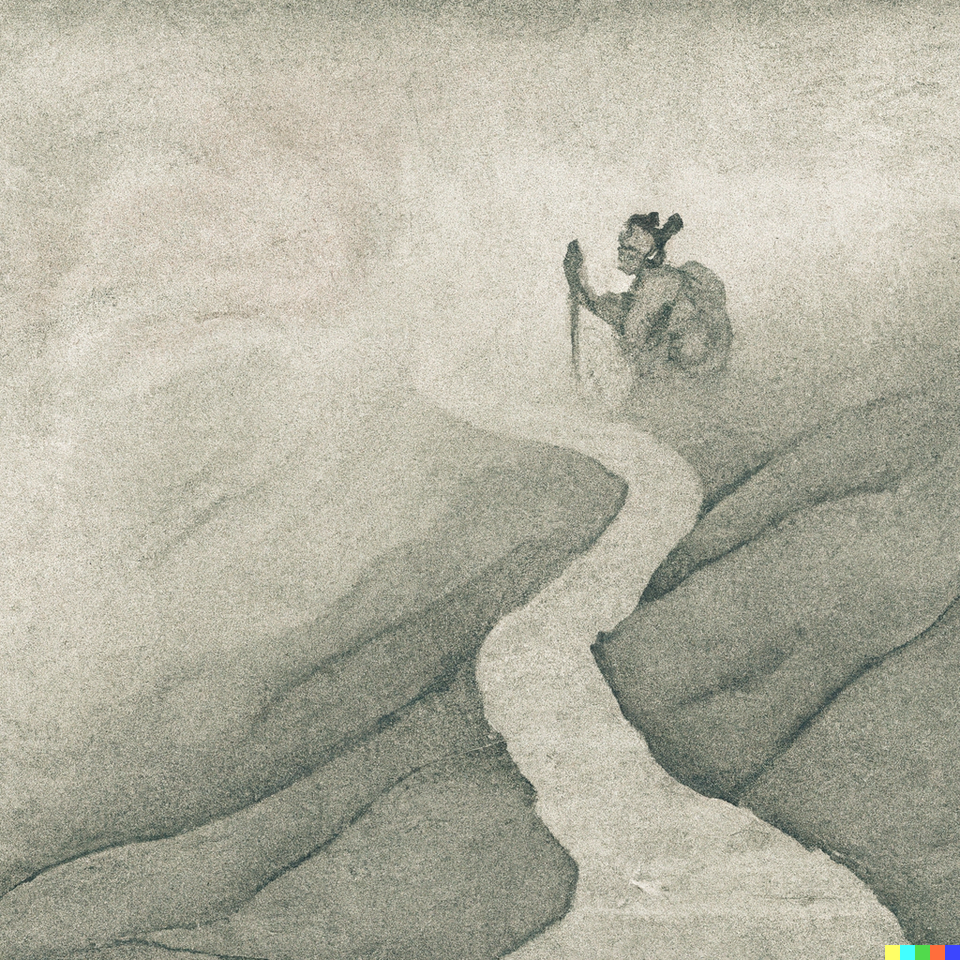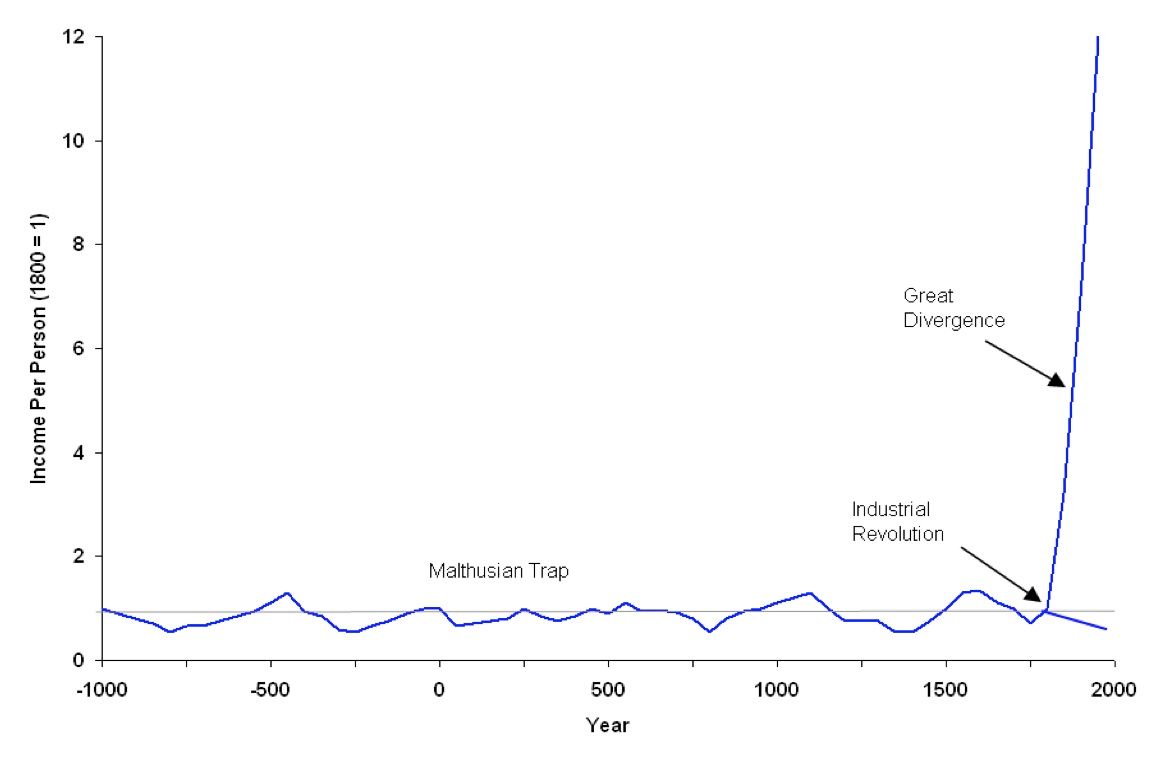One More Reason to be Optimistic

At one point I thought this too obvious to say, but I think it's worth saying aloud now. We live in a very rich society, and that is a good thing, an incredible thing.
The period within which we live is a result of incredible economic progress. Economic progress due to technological innovation. The statistics associated with this progress are astounding. Deirdre McCloskey, an economist at The University of Chicago, and the author of several of my favorite books, vividly illustrates the point in a 2012 lecture.
For nearly 50,000 years, each human on the planet survived on an average income of $3 per day. These were the hunter gatherer times (clearly they did not actually have dollars, economists are using the dollar amounts so that it makes sense to us). Then, agriculture was invented. And we got a little richer on average. But not really. Any changes in wealth were insignificant, and generally fleeting. At most we earned $8 per day, and only then for a few generations before falling back to $3 per day in income.

Then, the Industrial Revolution happened. And we all became incredibly wealthy. Each human in America now earns on average $150 per day, and worldwide, the average is $33 in real income per person per day. A tenfold increase on average worldwide, and a fiftyfold increase in America. The chart above illustrates this vividly (note the y-axis is unit-less).
Compared to all of human history, we are obscenely rich. Which somehow offends our modern sensibilities. After all, admitting to your own richness is not done in pleasant company. But it is true. And it is amazing. Being rich is a great thing. We moderns are so rich that we can do whatever we want— at least that is what it would seem to our hunter-gatherer ancestors. We are so rich we can try a different coffee every day of every week. We can fly to different continents in a single day. We can afford to spend much of our time learning— a role once only available for the select few.
Granted, there are many who do not see it this way. Or at least are not as optimistic. They overlook the good of our richness and point out all the obvious and real bad stuff. They are the pessimists.
They argue that poverty is still real. That people do not have opportunities for self-advancement. That some members of the lower classes are relatively disadvantaged. That we ought to be reducing inequities wherever they may appear. And in some ways, they are correct. There is undoubtedly still terrible poverty, even in America, and especially in less developed nations. We are still a long ways from Heaven on Earth. But, it is worth remembering that poverty, abject and terrible, was once the standard for everyone. $3 per day in income was the average for tens of thousands of years. That is many many generations of bleak poverty. At least that is no longer the case.
Furthermore, it is worth recalling that all ways of human organization tried result in some sort of inequity, even in those modes which profess to abolish it. At least Capitalism, or as McCloskey calls it, “technological and institutional betterment at a frenetic pace, tested by unforced exchange among all the parties involved,” makes us far richer on average than any other system yet tried. Again, being richer is better.
In general terms now, I will describe why being rich isn’t impolite, and ought to be a goal of any society.
It’s because being rich allows humans to flourish in an infinite number of ways.
As material wealth grows, so to does the number of ways in which humans can flourish. Being rich is the only means to realize human potential at scale. It is only in a rich society that the term ‘follow your dreams’ makes any sense at all. In a poor society that is genuinely bad advice. The dreamer probably starves to death.
Someone once said that beauty is variety in unity. The more variety that can exist within a unity, the more beautiful something is. By this logic, our richness has made the human race more beautiful. Jon Vervaeke, a professor at the University of Toronto, argues that increasing variation, then observing what remains invariant brings us a deeper understanding of truth. By this logic, allowing for greater human variety, while still keeping in view our commonality, brings us closer to understanding what it means to be human.
Richness, which is necessary for supporting wider varieties of human development, is a prerequisite for the realization of greater human beauty and understanding. It is the means to development and growth.
Optimism is a certain way of looking at the future.
It is a belief, a faith, a hope that things in the future will be better than they are now. Optimism assumes that we will be richer in the future than we are now. And I mean that literally, materially. Because material richness is a means to everything else.
An optimist believes that we can really feed the whole world, that we really can alleviate the mass, residual physical human suffering in the world. An optimist believes that we have not even come close to realizing what 8, 9, 10 billion minds can create if given the time and inspiration to do so. Again, this is possible only when we are rich.
Maybe it’s worth the thought exercise of what happens when we are poor. Actually, it’s not even a thought exercise, it is simply our past. When we are poor we cannot thrive as a species. Thomas Malthus rightly pointed out in the late 19th century that if population grows faster than the food supply, some people will starve. When we are poor, his prediction is correct. He did not predict, however, that through inventiveness, we would become rich, and find ways to feed a rapidly growing population.
Poorness is an outcome of un-inventiveness. Un-inventiveness is an outcome of non-adventurousness. Non-adventurousness is a result of pessimism.
Pessimism creates a poor future. Optimism creates a rich future.
Humans have the ability to see beauty and find meaning even in the most desperate of times. That is surely the lesson from Frankl's Man's Search for Meaning. But is it not better to find beauty and meaning in the least desperate of times? Imagine the wonder felt by the first people to travel across the country on an airplane. Or to drive a car to see their distant family.
We want to find meaningful moments in the least desperate of times. And that requires us to be rich.
Let’s be optimistic.
